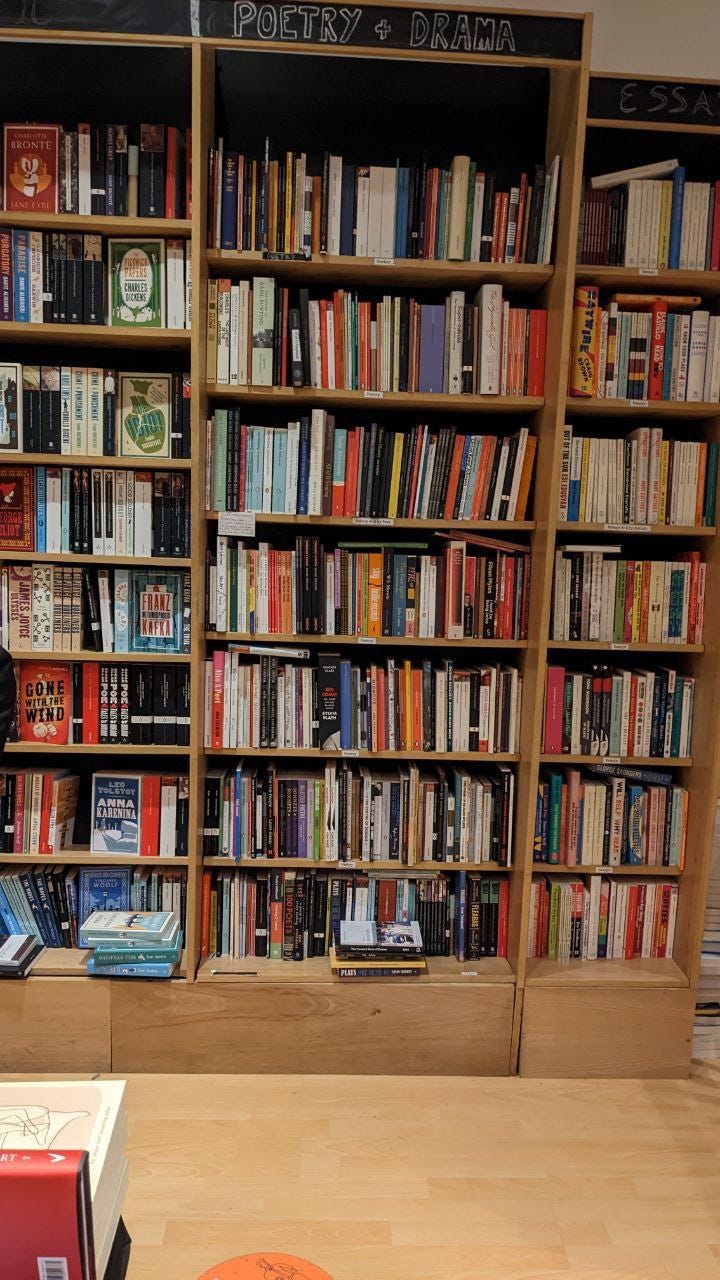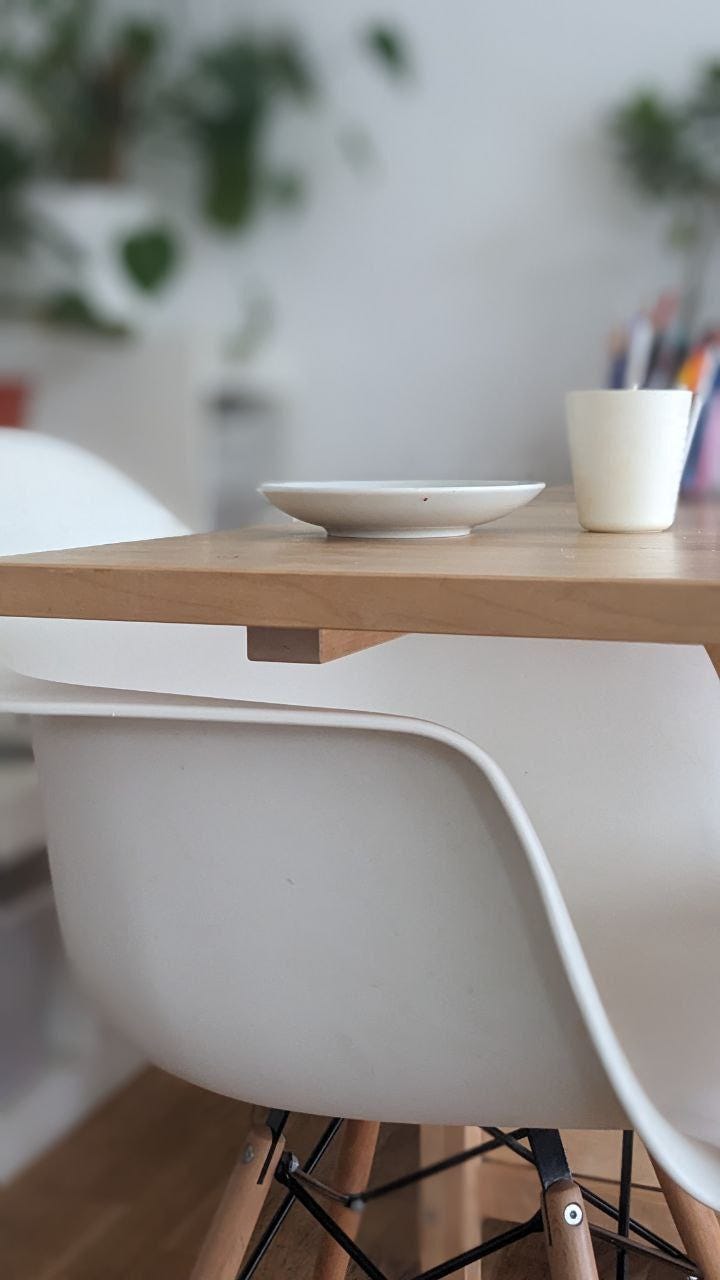I received a request to talk about impostor syndrome1. In the days running up to recording this episode, I was thinking about what I would want to share on the topic. What kept coming up for me, was the comparison between what you see from people or how they show up versus who they are in real life.
Looking from the outside at people I've met, who I looked up to, or whose work I really admired, meeting them in person was kind of a catch-22.
In many cases, I felt that meeting them was a little disappointing, it left me a bit deflated. I had fallen in love with this concept, an image I'd made in my mind about who I thought this person was—based on the way I received what they put out in the world. When I’d see them on an interview or as a guest on a show, and I got to watch them interact unfiltered in real time: I felt let down.
It’s symptomatic of only ever seeing the finished product
Think about an author who writes a book and publishes it. You then read it and if it resonates you think things like: “Gosh, this makes so much sense!” “The writing feels really good”. “I'm loving their voice”.
Forgetting that the final product has passed through many hands and that there are teams of people whose job that is to make this book readable and sellable. It may not necessarily be the voice of the author that you're falling in love with, but a combination of the voices that make up the finished, polished book you just read.
The same applies to the actors we see in film and television. We fall in love with a character that was imagined by a group of writers, put together by a stylist and costume design team, and perfected in hair and makeup. There's a whole machine tasked with the job of creating the seemingly effortless, believable, character that we are introduced to.
We form opinions about them and blurt out things like, “Oh, man! I love them!” or “They're amazing!”, while in actuality we don't know very much about the actors. We only got to know the character that was created and presented to us. It's one thing to memorize the lines in a script and act them out beautifully, and it's another entirely to have to be yourself—comfortable in your own skin, likable, approachable, and warm. That’s a tall order, and it would require some serious multitasking skills to pull off if that's not what you’re actually like.
Did You Know I Offer Weekly Women’s Support Groups?
There are weekday evening and weekend groups to join, with 5 spaces available per meeting. The 90-minute sessions meet online and can fill up pretty quickly. Consider joining us sometime.
Everyone feels it to some degree, at some point
Probably, depending on our personal insecurities, and the areas where we feel like we need to do more work. It'll show up and you'll have a flare-up of imposter syndrome as you approach the edge of your comfort zone. It’s a telltale sign that you're at a cliff where you're going to need to jump.
All of the questions come flooding in:
Who do you think you are to be able to pull this off?
What makes you think anybody's going to care?
What if it sucks?
What if you fall flat on your face?
What if everyone who thought this was a silly idea jumped out of a bush and said they told you so?
These questions about what it would mean to put yourself out there, come into your mind. There's definitely an element of risk, but there's also the reward of being actually known and seen. It's the same principle as acting. If you're always putting on a mask, the face that you're showing to the world isn’t your own. The idea of who you are that everyone comes to know and appreciate isn’t real; it’s a persona you’ve created. They come to love the character that you put out there.
They can’t actually know you or love you, because you never gave them the chance to. You were always showing up as someone different.
The desire to hide is understandable because there is risk involved with putting yourself out there. Creating meaningful work that you take ownership and responsibility for, that’s associated with your face and your name is risky. It’s risky because that ownership makes it personal. Any praise, positivity, or wins that are associated with that work feel personal. Likewise, the losses, criticism, attacks, or negativity also feel personal.
Intellectually you acknowledge that you are not the work, but there is risk associated with it. There’s emotional labor that goes into making things and offering them to strangers; who can react or respond how they see fit. I think the feeling of waking up and sleeping, knowing that you’re being true to form sincerely, genuinely yourself—there's a giddy kind of joy that comes with that. Even if it's not the most lucrative work, like a new business where you're still getting things together, there's a voice that's telling you:
We're doing it! We went for it, and we're doing it! We’re making something that we’re proud of, that matters!
Here we are putting in the work, look at us!
I think that sentiment is really, really beautiful. Succeeding on terms other than your own, or for the wrong reasons can feel like being out of alignment. Work like that, no matter how financially rewarding, can lack joy.
This is your sign to go for it
If you're on the fence about starting something or putting something out into the world, and you're hesitating and afraid, I would encourage you to go for it. You have to start somewhere. All of us sucked at what we did in the very beginning. It’s highly likely that our early stuff was not that great.

We felt all of the fear and battled the hesitation. I’d argue that in some ways it compromised what we ended up putting out. That fear changes the shape and energy of our work. If we're fixated on tailoring our work to please people, trying to imagine what they would want us to say, and then saying it—there's a lot of reverse engineering going on and not enough raw creativity. It’s not only exhausting to do, but when work made that way comes out, it can feel labored, and painstaking to see. On some level, the audience can hear you tap dancing. They can hear your shoes. It's not a great feeling.
Vibe, vision, and validation
This comes up for me with Instagram. It can seem like the people who follow you silently reward and punish you with their likes, shares, and attention. So if you're doing what they want you to, they share, like, and react in a positive way to reinforce and encourage you to create more content like that. Instagram gurus tell you to go look at your feed, see what people liked the most, and make more of that because that's the winning content. It’s what people are interested in.
I understand that makes perfect sense from a sales or content marketing perspective. However, if we're talking about your art—the work that comes from your heart and soul, that's true and real: I think it's a conflict.
You're allowing a group of people external to yourself (as grateful as we are for having people even care to follow us) to give you the cue on what you're allowed and not allowed to say. I don't know how much room is going to be left for you to actually be your true self. How much will you be censoring and editing while trying to conform to what they want you to be? How will that impact what you make? Are you going to be caught up in playing the character that they want to see?
Naysayers & gatekeepers
I remember when I started Recite & Reflect in 2015, I was terrified about showing up the way I thought that people needed me to because I was teaching something related to the Quran. Obviously, you don't want to mess around with anything sacred—or in this case literally divine, or tarnish it in any way. Naturally, you’d want to present in the best way possible. At the same time, I'm still a person. I'm still human, and multifaceted. I felt that very quickly I was being pigeonholed into this religious teacher figure. People start having assumptions about who and what they think you are.
When I started teaching the workshop, I was trying to get feedback from others who taught Quran and Islamic Sciences. I was asking them to look over the course material and give me feedback to improve it. I consulted a woman from abroad who was a Quran teacher. We got on a call and almost immediately she turned on me. This lady came at me swinging!
“Look at the way you're dressed in the profile picture!”, “What right do you have to teach this?” “Who did you study under?”
She began attacking me, demanding I prove myself to her. I understand the importance of verifying the authenticity of Islamic knowledge and making sure that there's no funny business going on. Making sure that what's being taught is authentic and correct, that's standard. It’s also something you can find out from the footnotes of a workbook, in a bibliography, or in a list of references. In other words, you can easily look it up.
The shakedown was not about her concern for the validity of the content. The shakedown was about her putting me in my place. Telling me that I don't match the image in her mind of someone who teaches Quran-related content. She was gatekeeping. Blocking the door to the Qur'an Authority Club. She was telling me that if I didn't dress the part, look the part, and go to the approved institutes or programs—I wasn't welcome there and my work would go nowhere.
All of the titles, and none of the substance
I was blown away by how somebody could reach that level of respect and recognition for their work, come from a prestigious background, and still be an unkind, judgmental, closed-minded, backward human being. It was yet another example of meeting someone up close and being disappointed.
Sometimes spiritual maturity is nonexistent. It's very easy to study texts and get diplomas or degrees. Many can say they sat at the feet of the scholars, regurgitate Islamic texts verbatim, or become proficient in a field. Unless they couple that knowledge with growth, humility, maturity, wisdom, and sincerity, they will be found lacking. These qualities don't automatically come with age or education, they’re earned.
It's definitely been a journey, over time it's been about finding the balance between being able to be myself and this person who people expect. Bearing in mind that I don’t want to alienate anyone, let them down, or be a bad example. I want to be able to model that it’s okay to be a whole human being.
I'm a person
I'm an individual, and I have different sides and temperaments. I go through the changes that other people go through. I grow, I evolve. I can have all of that going on and still love the Quran and still want to share something beneficial. I am allowed to be quirky and a little weird, dorky, or whatever. I don't want there to be this fear that I'm going to be penalized for showing an unacceptable side of myself. I don’t want to perform for a group of people who are willing to hear what I have to say or care about it—so long as I do it on their terms, in the way that they want, as the person they expect.
When was the last time you felt like an imposter? What was it you were doing that brought the feeling to the surface?
As always Jazakum Allah khair for listening and I look forward to sharing more!
Sincerely,
Sumayah
Is it Impostor or Imposter? Apparently, both of them are correct. It was my instinct to spell it with an “e” and the AI that transcribed the episode used an “o”, so I googled it and both are correct.
















Share this post